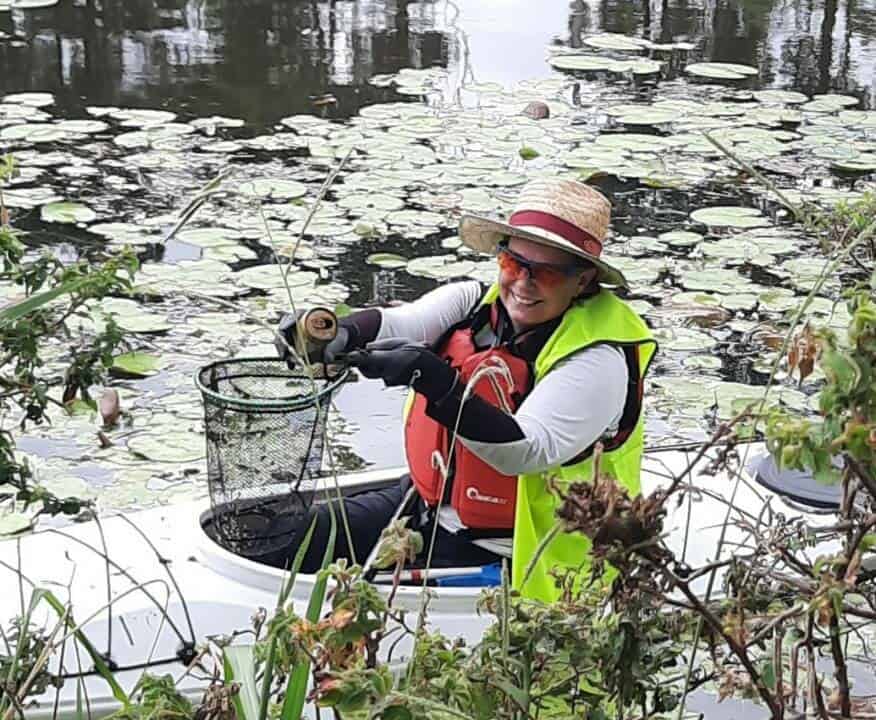Springfield Lakes Nature Care (SLNC) starts every year with one of our most well supported events, Clean Up Australia Day.
This event has become Australia’s largest community-based environmental event with over 10,000 clean ups taking place across the nation. From the beaches of the Torres Strait Islands, to Tasmania, from Byron Bay to Western Coast of Australia and everywhere in between – this Clean Up Australia Day 2024 saw over 750,000 volunteers coming together to help Clean Up their local communities and environment. It was an outstanding effort by volunteers who joined up to remove litter from our suburbs, parks, creeks and lakes – a truly special day of community action.
This year, 62 volunteers attended our local clean up, including 30 Scouts, Cubs and Joeys from Camira, who always show up with their enthusiasm and team spirit to demonstrate to other generations what can be achieved when we all work together on a common goal.
They happily picked up coffee cups and alcohol beverage containers, most likely thrown from car windows which could only have been discarded by irresponsible adults.
They also collected items of household waste dumped in bushland or left in parklands. SLNC also had support from the Navodaya Brisbane group, who volunteered to clean up the streets and roads around the peninsula of Discovery Lake.
This community group was also joined by the Greater Springfield Indian Association, all of whom wanted to help clean up the litter left behind by other people.
Charis Mullen MP, Minister for Child Safety, Minister for Seniors and Disability Services and Minister for Multicultural Affairs and her staff also assisted in the annual clean up, taking on the Greenbank Arterial Road, witnessing firsthand the amount of rubbish discarded by drivers.

SLNC are truly grateful for Toni’s single-handed effort in Cleaning up Discovery Lake, collecting all manner of floating items; plastic bottles, balls, plastic containers and shoes. Toni did an awesome job along with her land support member Peter, who took her full bags of litter from the shoreline. Toni collected three full garbage bags of plastic bottles and cans. Some of these were able to be taken to the Container Exchange Centre to be recycled, with the funds from the scheme deposited into SLNC’s bank account. This enables the group to fund environmental activities, such as Platypus Watch and community planting events.
SLNC audited the litter collected, taking a sample of six full bags of litter to record the quantities and types of litter collected. While the new government measures to remove plastic straws, cutlery and plates and the recent banning of thick plastic shopping bags has clearly had a significant impact, we still counted over 63 soft plastic chip and food wrappers, as well as 11 plastic takeaway cups from bubble tea to frozen drinks. Perhaps this is also something that retailers and consumers can start to consider.
It is disappointing that so many small items, such as chip packets and lolly wrappers end up being thrown on the ground, as these discarded items usually end up in our creeks and waterways before ending up on our beaches. It surely cannot be too hard to put the empty packaging into a pocket or hold it in your hand until you get home or come across the next rubbish bin. The same goes with the coffee and take away beverage cups – these items can easily be stowed in the cup holders in most cars until they can be discarded.
#StowitDontThrowit has become a simple message that we would like to think everyone can get behind to be more responsible about how they dispose of their litter.
Clean Up Australia chair Pip Kiernan emphasised the importance of responsible litter disposal.
“For every piece of litter collected, it is one less in our natural surroundings,” she said.
“Soft plastic pieces, cigarette butts, vapes and single-use plastic beverage bottles are amongst (those) commonly collected by volunteers, and you can’t help but be shocked by the scale of what ends up in our environment as litter.”
